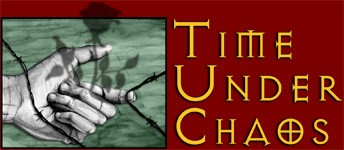
Chaosian Dueling TraditionsIndex | Time Under Chaos | Concerning Chaos | Chaosian Dueling Traditions If it weren’t for formal dueling practices, vendettas would probably be even more common in the Courts than they already are. Duels provide a formalized, very public way of recovering face or settling conflicts without starting a war. It’s considered very bad form to pursue an issue after a duel has settled it (which is not to say it doesn’t happen from time to time). The traditions are, of course, complicated. The challenged party has the right to select one of a large set of long-established “modes” which are known by names that probably refer to somebody who established the mode a long time ago. Most formal duels are not fatal; if the matter is that serious, usually only a war will satisfy the parties anyway. Non-fatal duels are (in many modes) “scored” in a manner very similar to Karin Sword Dancing traditions (no doubt they use some of the same judges). In general, the duel ends when one party yields, is incapacitated, or acquires a pre-established number of “points.” There are no points for style in duels, only for damage. The following is an example of the parameters of a dueling mode, omitting the bits of theater and manners that also accompany such events. Naftalon Mode Duel
Breaches of propriety in this mode – which can result in loss of points or the ending of the duel, with victory being granted to the non-offending party – include attempting to actually kill one’s opponent, significantly changing one’s form during the bout, and using non-permitted powers. The judges watch for that sort of thing. Other notes: The combat is supposed to stay within the established area for it. Spectators (of which there are usually many) are not permitted to interfere in any way, and may be ejected from the arena. Betting, however, is allowed. Every effort is made to confirm the identity of the participants – sending in a ringer is a serious breach of protocol, but it has been tried. Supporters of the two sides are usually placed at opposite ends of the arena, for safety’s sake. At the conclusion of the bout, the loser makes a public apology to the winner. This has to be relevant to the situation that spawned the duel or it’s all to do over again. |